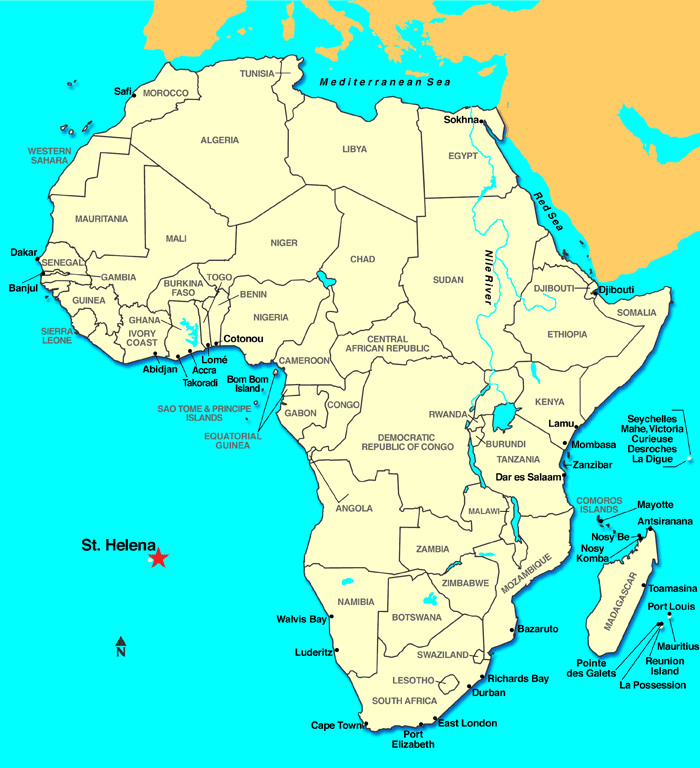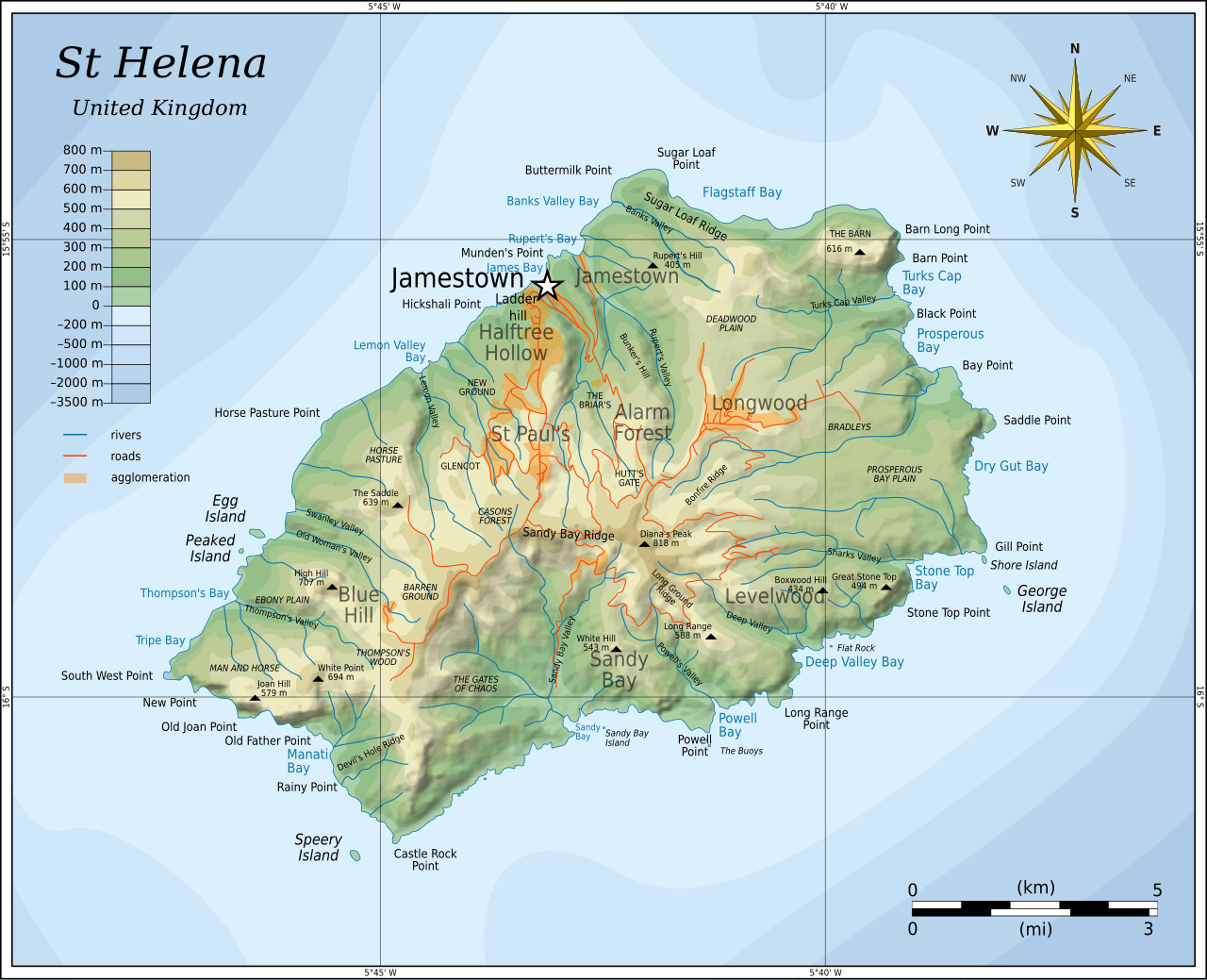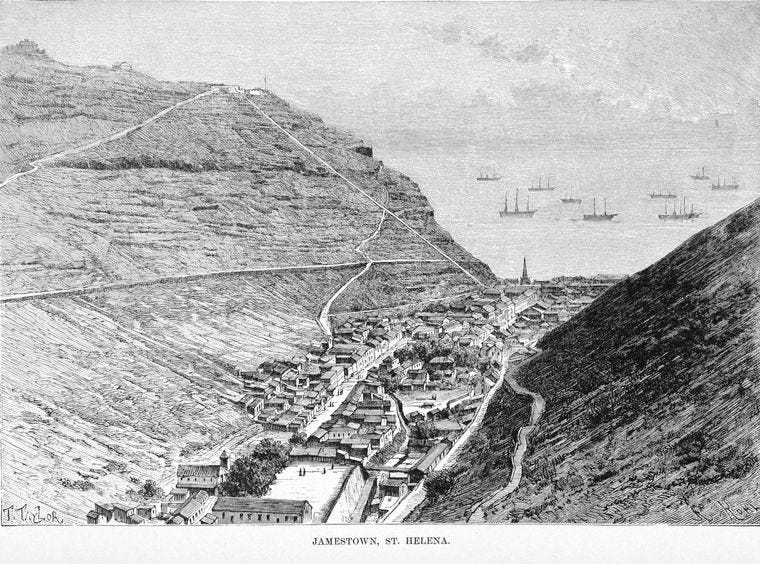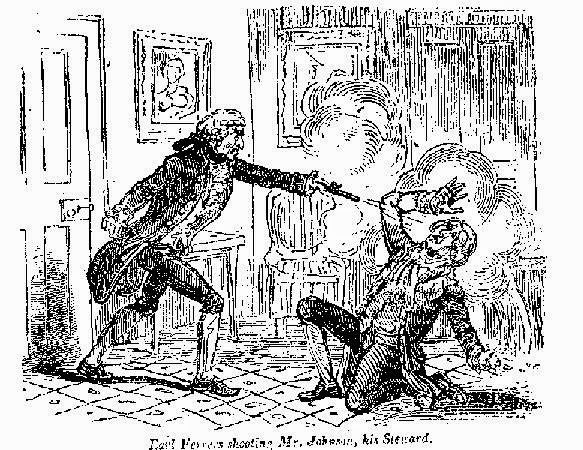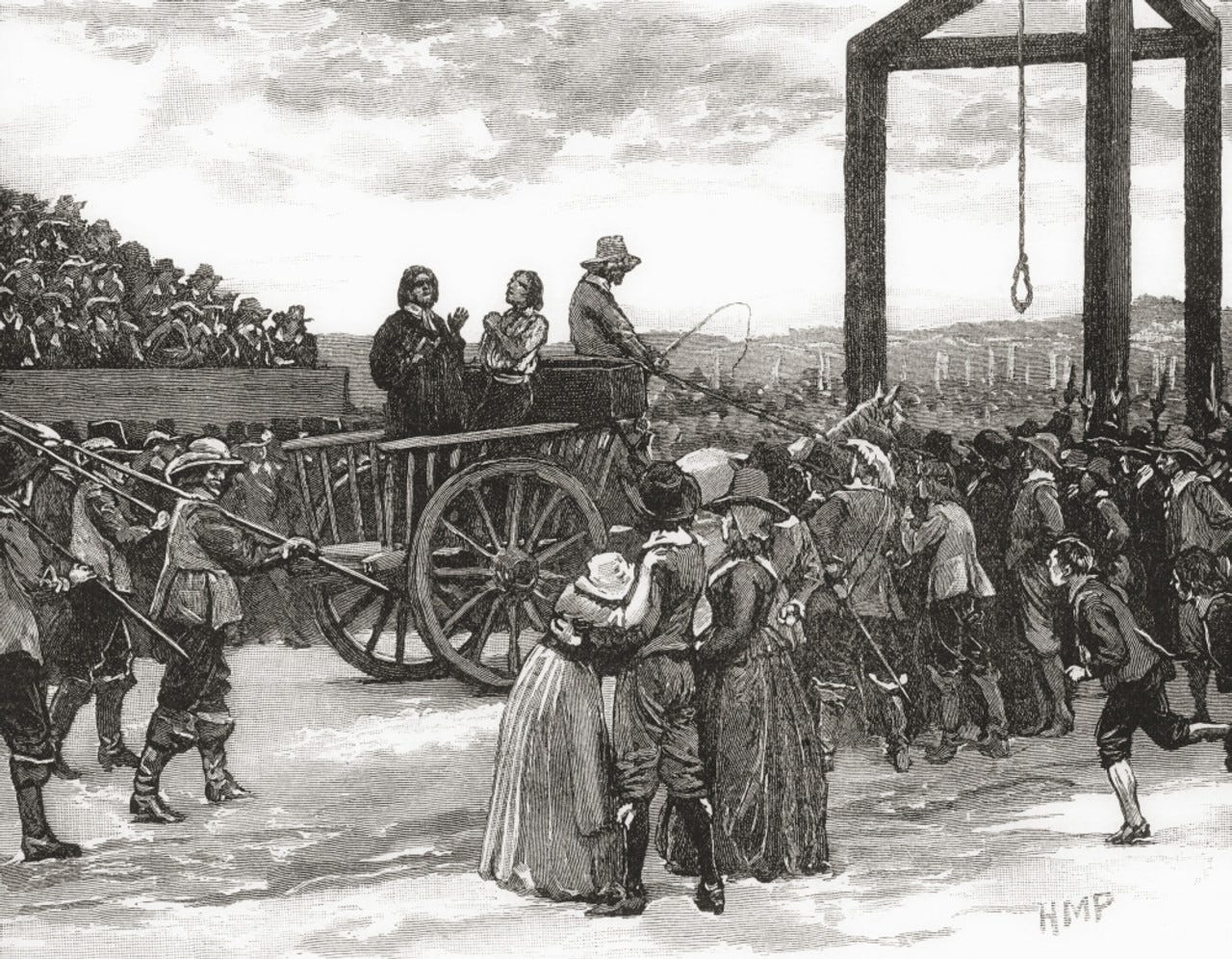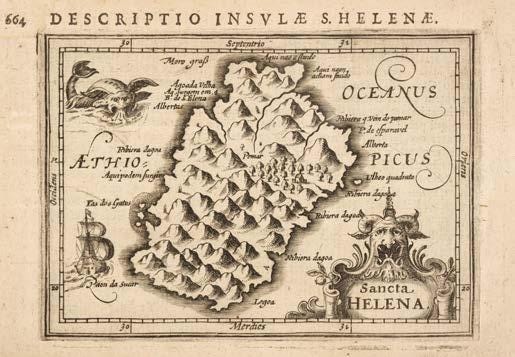Mason & Dixon - Part 1 - Chapter 11: The Progress of Empire
Analysis of Mason & Dixon, Part 1 - Chapter 11: Spat at the LeSpark's, Arrival at Saint Helena, Florinda, Ferrers at the Gallows, Technological Progress
At home, the LeSpark clan discusses Saint Helena, the next destination of Mason and Dixon after leaving the Cape of Good Hope. Saint Helena, found by Europe in the early 1500s, was quickly colonized by the British East India Company (EIC). It was later taken over by the Dutch East India Company (VOC) until the EIC once again reclaimed the land not long after. Saint Helena, despite being an incredibly small and not particularly habitable island off the west coast of Africa, was nonetheless an incredibly important waypoint for travel by sea. It provided a port and resting point for Europeans looking to travel south to Africa or even to circumnavigate the continent to make it further to India and Asia.
Aunt Euphrenia recalls the island once being lush with “Orange and Lemon-Groves [and] Coffee-Fields,” (105) where it is now filled with an overabundance of bars and alcohol for ships making port so more drunken travelers can rest and get their fill of booze and women. The Reverend responds, stating that this era of tame agriculture is long gone. Along with this, he tells them that he does not have a firsthand account of Mason and Dixon’s journey to Saint Helena since he ended up travelling further East toward India. This means that, once again, the story he is telling will have been told to him by other perspectives, this time from Nevil Maskelyne, the soon-to-be Astronomer Royale who was originally going to be Mason’s partner to map the Transit of Venus until Waddington took his place (1.9). Maskelyne and Waddington, who failed in conducting their viewing of the transit due to cloud cover, who also failed to measure the parallax of the constellation Sirius and the moon due to “a defective Plumb-line suspension on his Sector,” (106) would be there when Mason and Dixon arrived. History is once again being told through warped lenses and embellishment. As is natural, right?
Cherrycoke prods a bit, criticizing Maskelyne for having continued “publishing his Almanack and doing his bit for global Trade” (105) — in other words, for becoming a capitalist in the full sense of the word before capitalism really made its way on scene. This criticism is another of Cherrycoke’s many attempts to subvert the patriarch of the house’s brainwashing on his children. The patriarch, J. Wade LeSpark, immediately picks up on this attempt and calls out Cherrycoke, asking, “Something wrong with that, Wicks?” (105). Cherrycoke responds in a slightly antagonizing way, inferring that it is in fact wrong since Maskelyne would be furthering science in the hopes of making a quick buck for himself and the Royal Society instead of for Celestial means — ‘Celestial’ both inferring the furtherance of science for a better understanding the universe and for going against God’s will by giving into material greed. J. Wade can only attempt to make fun of Cherrycoke by accusing him of having a holier-than-thou view of the world so as to tell his children that it does not bear fruit to be overly optimistic and utopian in one’s outlook of life. The spat is tame, likely because J. Wade does not wish to lose his cool as that would signify to the listeners that this minor comment by Cherrycoke was something important and worth paying attention to.
When questioned about why Maskelyne may have stayed on Saint Helena as long as he did, Ethelmer states, implicitly, that it’s pretty clear because, at twenty-nine years old and being away from home for the first time, he wanted to indulge in the booze and women which the island was now known for providing to travelers. Tenebrӕ, stating, “Why Coz, how interesting,” (106) seems to also be stating, ‘ah, I see what you’ve been getting up to out at Princeton.’
The story continues, told by Cherrycoke based on whatever he had heard from Maskelyne — who, given he is now away from home for the first time, indulging in booze and women about as much as he could muster, may not be the most trustworthy figure (but again, when has history ever been written by someone who was not intoxicated with bias and some other mind altering substance?).
The astronomers landed at James’s Town (in our modern day known as Jamestown), the main port town on the northern coast of Saint Helena. It is a town shaped like a column, moving back into a valley between two steep hills — a town that perhaps should never have existed. Here, one heard the waves crashing incessantly against the coast, vibrating the floorboards and walls, shaking the roofs, keeping the citizens and visitors aware of their mortality, being surrounded by steep rocky edges on one side and the roaring ocean on the other. Maybe that’s enough incentive to keep them spending money on the many purportedly consequenceless pleasures here.
It is a town where the sun does not rise and set — the dark rises and sets. The good does not sleep or wake — it is the evil that does so. In this town, “No change […] is gradual,— events arrive suddenly” (107). Coffee is not native here, but now the island is renowned for its coffee; the sea may very well surround it, but it feels as if the island has sunk beneath its waves; the wind on the islands blows heavily and yet is as tenuous as those who live and visit. It is a land that itself is apocryphal. Jamestown is a place free from societal law, where each resident and visitor is aware of its artificiality, and yet proceeds to normalize its unnatural existence.
Because of this, Saint Helena is set up (just as the Seahorse was in 1.6) as a microcosm, though this time moving from the Seahorse’s historical and biographical analog to Saint Helena as an analog for the world’s deformation into one that serves Capital. We see a land without native fruit now in the production of such. And its purpose is to serve as a waypoint for vessels that are conducting trade, simultaneously existing only to extract wealth by providing pleasure. The land is thus defined as a place where “the only Choices within one’s Control [are] those between Persistence and Surrender” (108). These are our exact choices as long as we are resolved to remain within the system: we persist in our suffering, living on the edge of danger in an inhospitable world, spending the little money we make on pleasures that only satisfy us in the acute sense, or we surrender, allowing the island to sink beneath the waves, drown beneath the Rollers, and allow the sea to triumph. Saint Helena — the world in which we live — is a place for lost souls, ‘Convicts,’ and ‘Company Perpetuals.’ It is a purgatorial wasteland of waiting and monotony in which we are kept complacent through the menial pleasures that we can purchase, keeping us from ever ascending to heaven.
There is one major difference between Commerce in our time and in the time of Mason and Dixon: wide scale wage slavery versus actual slavery.1 Back then, “Commerce without Slavery [was] unthinkable, whilst Slavery must ever include, as an essential Term, the Gallows” (108). The threat of literal death forced the slave to continue their work, increasing the profit of the slaveowner. With the abolishment of the slave trade and subsequently slavery as a whole, commerce had to be thought of without slavery or else global trade would cease to produce significant enough profit. This is where wage slavery, serfdom, and the general poverty cycle took slavery’s place, now using the threat of death via different means. Instead of literal outright execution, it is systemic (though invisible) murder. It is labor forced upon the person with the threat of starvation, a lack of housing, or imprisonment. And slavery of course has worked its way into the world in its own new way through the prison system, abuse of third world citizens, and the rise of compradors willing to exploit their own nation’s people to garner wealth and support from wealthier nations.
As the descriptions of Saint Helena end and the dialogue comes back, Mason and Dixon stand in line to debark the ship where a woman is in line who recalls Mason from some time ago. Her name is Florinda. They met at the hanging of one Lord Ferrers in May of 17602 just about a year after Mason’s wife, Rebekah, died in February of 1759. The hanging occurred in Tyburn, the same infamous location where so many other hangings occurred at which Mason and Dixon discussed in the pub at their first meeting (1.3). Lord Ferrers (whose actual name was Laurence Shirley) shot his family steward under the pretense that he was both attempting to rob him of his wealth and his wife. Ferrers was an English Nobleman, and his steward was basically a glorified servant, so the fact that Ferrers was actually tried and executed for this is quite the surprise given the nobility are so infrequently punished for their crimes, especially those involving the underpriveledged. Could this be a sign that even the Elite are not immune to punitive measures or is this simply the case of someone not being high up enough to be worth saving, and perhaps even worth killing to prove to the masses that, ‘look, things are fair here; even the Elite can be killed if they are in the wrong!’ It is also likely that some of the masses would have bought into this reasoning if that were the case because “The execution of a British nobleman would have been a major event, surrounded by all the publicity of a modern tabloid ‘true crime’ story” (Biebel, 60).
The year of 1759 after Rebekah’s death and the beginning of 1760 up to this point was rough on Mason. Before things ‘officially’ flash back in time, we learn that within this year Mason was a frequenter of something known as the Hellfire Club, a private society which allowed those Elites who could gain access to it to indulge in various perverted fantasies. Jonathan Swift, the canonical author, even described the club as a “brace of monsters, blasphemers, and bacchanalians” given their notoriety for acts of excessive drinking and sexual assault.3 On top of this, the group had Masonic undertones with their proclivity toward ritual, tradition, and mysticism, thus rendering them of the same type (though maybe not to the same severity) as the Anubis (Gravity’s Rainbow, 3.14-3.18, 3.22, & 4.5), the rooms in the back of the bar at Portsmouth (1.3), the room with high-backed chairs at the Casino Hermann Goering (Gravity’s Rainbow, 2.2), or even something such as the Elite mansion in Kubrick’s Eyes Wide Shut. It is a place where those sexual fantasies can be indulged without consequence, and Mason’s use of the society raises suspicion despite his purpose seeming to be more of an “evil-in-innocence” through “lower-situated imitations of the Hellfire Club” (110). So, like Slothrop upon the Anubis (Gravity’s Rainbow, 3.15), Mason sought some form of elevation from the Preterite by participating in the rituals of the Elite. However, there is no evidence that Mason actually did something as pedophilically evil as Slothrop did, and based on his character one can assume that he is innocent in that regard. Yet the fact remains that the desire to potentially ascend remains with him.
As we are about to enter a flashback to this point of Mason’s life, the children are sent to bed since the flashback will not be so educational and will take a slightly more explicit turn.
Mason’s attendance at Tyburn was, unlike the typical attendee’s desire to witness the rare hanging of a Nobleman, to court some of the potentially emotionally vulnerable women attending this same event. This is where he met Florinda, the both of them catching one another’s eye and embarking upon a flirtation filled with sexual innuendo. Within this conversation, Mason proposes that the innocent who are hanged are the ones who will achieve an erection upon death, while the guilty will remain flaccid. Biebel states that erection and flaccidity’s representations of guilt and innocence are oppositely distinguished in works such as Gravity’s Rainbow. Here however, Mason’s reasoning for such a claim is that while the victim may fall at the hand of the other, they are the one truly at the peak of surprise, while the assailant is seeking this excitement or vengeance as a means to raise his ‘mood.’ Thus, the different ways of presenting one’s guilt on the gallows. Though, Mason has an alternative reason for conducting this analysis as well, likely trying to show Florinda that he is innocent in his intentions and thus just as virile as she may be hoping for.
Ferrers has requested to be hung with a silk rope, likely in the hopes of making his death more comfortable or at least for it to appear more opulent in works of history. His death, mostly, would be forgotten. While he, a nobleman, believes he has made it in the world — destined through wealth and grandeur to be a name remembered for centuries — he was a mere blip on the radar of history, being no such man of actual importance (which is why he’s in the position he’s in in the first place). This is another tactic we have often discussed, where certain people are elevated to specific levels of power to keep them complacent, but are not given enough power to ever actually do anything worthwhile. Some of the attendees immediately realize this irony, stating that if they were to ever be subjected to the gallows like this, a basic hemp rope is all they would need. For, any hope of comfort in death, or being remembered after death, is irrelevant. The Preterite are well aware their names will be forgotten to time, likely as soon as a passing generation or two, and their stories even sooner. And further, silk is opulent in this land, but in places around the world such as India, it is commonplace among those who commit banditry, among the peasants and working class, among countryfolk. So, what really is the difference in circumstance except the level of wealth and power one has in the acute sense, allowing one’s fleeting existence to be just a bit more comfortable while it lasts? It’s going to end the same way, and the noblemen here merely hoard those comforts in hopes that something can be better for them in the end.
Mason and Florinda, perhaps seeing these connections or perhaps just acting on instinct, decide they have more interest in pursuing comforts rather than witnessing the end of a life. So, they move on together, watching as the trapdoor fails to properly fall below Ferrers’ feet, and drink wine while discussing the possibility of the increasing complexity of machinery and technology running the lives of individuals in the near future. Because a trapdoor is something simple. A lever is pulled, and a door drops. Yet, with an increasing need for overly complex mechanisms in order to make things work more smoothly and efficiently, sometimes the opposite conclusion is achieved. Science, for all intents and purposes, often pushes boundaries that don’t need to be pushed, for why make more complex what already works to the exact degree you need it to? Why add unnecessary touch screens, push to start buttons, knobs to shift gears, and so on, in cars? With this increasing level of technology and mechanical complexity, everything is more prone to break and malfunction making those possible minor advantages that were achieved through this progress entirely irrelevant in the inconvenience they now cause.
When that conversation comes to a close, the flirtation begins again. It is revealed that Florinda has been using Mason as a sort of ‘practice dummy,’ though that does not immediately mean she is not heavily attracted to him. Before anything too raunchy occurs, and it is unclear if anything did really happen between the two, the scene shifts.
Back on Saint Helena in the present, when Mason and Florinda become reacquainted a year after their initial meeting, Mason is surprised to see that she actually remembers who he is.
So why this flashback, and why here? Because Saint Helena being a waypoint that only ever could or would exist within an increasingly imperialist world, is now calling out to these could-have-beens. Yes, Mason could have made his attempt at love, yet his desire for notoriety and science took precedence. Florinda could have sought someone who she believed was the exact type she was looking for — “I have ever sought a man such as yourself” (112) — and instead settled for this hollow-eyed specter of death husband who believes Mason to be nothing but a jester. And the world could have remained simple, creating and progressing when it truly made sense to create and progress, but the call of profit rang higher than that of comfort and survival. So here we remain among the Rollers, in a land that descends into darkness with each passing night, where nothing grows but what is unnaturally introduced, where the only thing that matters is momentary pleasure to forget that existence has been rendered unbearable.
But maybe Dixon, always being the more lighthearted of the two, is the only one who is successful at warding off these feelings of our trek toward the hell of the next few centuries. His jokes may repeat, and he may be unaware of the trouble he is sometimes getting himself into, but he is happy with the type of life he has always led — an unchanging life and worldview. Or, if changing, hopefully for the better.
Up Next: Part 1, Chapter 12
And this is not to say that actual slavery does not still exist, it is just not the main form of labor exploitation used for profit.
Remember, we are currently in June of 1761.
Ryan, D. 2010. ‘The Dublin Hellfire Club’. In: Kelly, J., and Powell, M.J. (eds). Clubs and Societies in Eighteenth-Century Ireland. Dublin: Four Courts Press.




